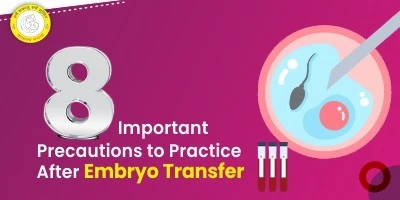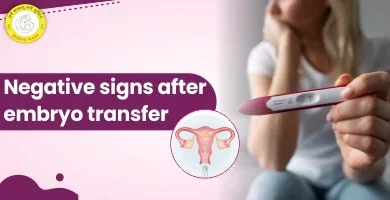Precautions After Embryo Transfer in IVF: Tips & Guidelines

Embryo transfer is a critical phase in the in vitro fertilization (IVF) procedure in which an embryo produced in a laboratory is implanted in a woman’s uterus. This technique is essential for couples attempting to conceive through IVF. Understanding what to do and what precautions after embryo transfer in IVF to take might improve your chances of a successful pregnancy.
So, let’s have a detailed discussion over precautions after IVF and some tips and guidelines to increase the chance of success.
8 Precautions After Embryo Transfer in IVF
In this Article
It is said that prevention is better than cure. We all have heard this statement at least once in our lives, and this is something we must take care of.
Embryo transfer is a critical phase in IVF treatment, and it is mostly performed by experienced IVF specialists. Once the embryo transfer is completed, the wait for pregnancy begins. Certain measures should be taken following embryo transfer. The essential precautions after IVF include:
1. Rest and Physical Activity Recommendations
You just had a potentially life-changing process! Celebrate this change and take some time for yourself as you wait for the next step. After the transfer, the embryo is expected to implant. It takes a few days, so allow yourself some time to relax and recover. Some experts will advise you to take some time off, if possible, and some may ask you to live normally as you were living. But do not worry. You do not have to be on bed rest or lie down all the time.
Maintain a cheerful attitude and limit your tension. Meditation, playing music, connecting with loved ones, engaging in interest-related activities, or revisiting old pastimes are all good strategies to relax and rest.
Light activities like short walks can improve blood circulation, which benefits implantation. Avoid strenuous exercises, heavy lifting, or sudden movements that could strain the abdomen or pelvic area. Keep your body calm and relaxed to allow the embryo to implant securely.
2. Lifestyle Changes
Say no to smoking, alcohol, and caffeine. Adopt habits that foster a supportive environment for the developing embryo.
If everything goes as planned, you’ll be carrying a tiny being inside your body for the next nine months. This is an ideal time to adopt the healthy eating habits that experts recommend for pregnant women.
Ideally, you should consume a variety of fruits and vegetables, as well as foods high in calcium, protein, B vitamins, and iron. Even if you’re eating well, consider adding a prenatal vitamin to your diet.
3. Relax and follow the doctor’s Prescription
Closely follow all the medications and supplements that have been prescribed and recommended by the doctor. These can be hormonal like progesterone which are crucial in supporting a pregnancy. Swallow tablets and capsules as soon as possible and never change the amount on your own accord. Further, one should engage in relaxation techniques such as deep breathing or light meditation as a stressed mind is not healthy to the human body.
4. Emotional Well-being
Emotional balance is just as important as physical care, yet often it is neglected. It is good to know that the IVF process can be emotionally straining but try not to focus on this while focusing on the results. Be involved in things that interest you, for example, reading books, listening to music, or spending time with family that supports your decisions. Stay with pleasant people and do not attend events which turbulent your feelings and emotions.
Remember, happiness is the key to success (Yes, it works in this matter as well).
5. Monitoring Symptoms
You should keep a look out for specific symptoms that may emerge in the days following your transfer.
Women taking fertility medicines may develop a disorder known as ovarian hyperstimulation syndrome (OHSS). This can occur when your body reacts dramatically to the injected hormones used in the IVF treatment. OHSS can cause symptoms like abdominal pain, abdominal bloating, nausea, vomiting, and diarrhea. These symptoms can be moderate, but they can potentially worsen rapidly if you have a severe form of this illness. If you rapidly gain weight or experience significant abdominal pain, do not wait. Call your doctor and discuss your symptoms so you know what to do next.
6. Diet and Nutrition Tips
Alright, let’s talk food – because who doesn’t love to eat? Your mission: load up on fruits, veggies, whole grains, lean proteins, and healthy fats. Think of it as building the perfect “embryo nest” – soft, cozy, and full of nutrients! Spinach and fortified cereals are your besties because they’re packed with folic acid, a superstar for early pregnancy. Don’t forget to sip water like it’s your favorite mocktail – hydration is key! Just steer clear of sugary sodas and caffeine overload. Keep it balanced, and your taste buds (and embryo) will thank you.
7. Staying Positive and Reducing Stress
As is true with most conclusions made about the human character, there is a significant amount of truth placed on having a positive outlook on life. Stress and anxiety produce hormones that can disrupt implantation or prevent it from occurring all together. Do some gentle yoga, meditation or other activities to combat stress. Sharing of experiences with others who are also going through IVF through journaling or joining a support group is also beneficial since it reduces the feeling of loneliness.
This is the moment when your partner, family, friends, and fertility clinic can be quite helpful. Anxiety is a terrible thing to deal with, and isolating yourself during this time can exacerbate it. Don’t try to handle all of the burden on your own. Allow your loved ones to cheer you on as you wait to learn whether or not the embryo transfer was successful.
8. Avoid harmful chemicals and heat
Begin paying great attention to the household products and other equipment that you utilise. You may wish to avoid using products that include compounds such as bisphenol A (BPA), phthalates, parabens, and triclosan, among others, or limit your exposure to them. These are known as endocrine disrupting compounds (EDCs).
EDCs are compounds that can disrupt the natural function of your body’s hormones. According to the Endocrine Society, several EDCs can cross the placenta and become concentrated in your baby’s circulation at a critical point in their development.
These substances can even interfere with your baby’s organ development while in pregnancy. Later, early exposure to excessive doses of these substances may create additional developmental problems
Also Read: What are the Positive Signs after Embryo Transfer
Conclusion
So, this was all about Precautions After Embryo Transfer in IVF, not when you know the precautions after IVF, it is up to you to follow these and improve your chances of success. The simple fact is that in the days following embryo transfer, you are essentially playing a waiting game. While it’s a good idea to follow the do’s and don’ts list and build some positive habits that you can stick to throughout your pregnancy, the majority of what you do could make a difference.
At Diwya Vatsalya Mamta IVF, our experienced team of fertility experts is dedicated to guiding you through every stage of your IVF treatment. To learn more about our IVF treatments and the services we provide, visit our Fertility Center in Bihar.
FAQs
Should I be on bed rest right after the embryo transfer?
No, you do not have to stay completely immobile in bed unless your physician has ordered bed rest for you. Most of the time, light activity like walking around the house or going for a short stroll should be allowed. For the first couple of days, light lifting or carrying of potentially heavy objects, and challenging exercises should be discouraged.
What should I eat in order to facilitate implantation after the procedure has been done?
Pay special attention to what you are eating as well as including fruits, vegetables, whole grain products, lean protein, and healthy fat sources. Take foods with folic acid such as spinach and ensure that you take a lot of water. Do not consume beverages with added sugar and limit consumption of caffeine products.
Can stress hinder embryo transfer success?
Indeed, high stress could lead to the release of hormones that could prevent implantation. Calm down using scenes, light exercises such as yoga or write if things are getting overwhelming. It is also helpful to join a support group.
Can I take caffeine after the embryo transfer process?
Caffeine intake should not exceed one cup of coffee or tea daily, or should be avoided at all, to allow for successful implantation.
Is it normal to have cramps and weird spots after the procedure?
Light contractions and some brown or red spotting is normal and minor cramps are ok. But if the pain is extremely severe, you’re bleeding heavily, or you’re running a fever, you should confer with your physician.
Which chemicals are harm full?
Minimize contact to types of chemicals used in cleaning products, pesticides, and in painting. In the event of choosing between two materials, choose the one with natural or non-toxic properties for health concern.
What can I do for emotional health?
Spend time doing things that bring joy, cherish your body and mind, and spend time close to people you adore. It helps to talk to a support group because it makes you feel like you’re not lonely when going through this.



